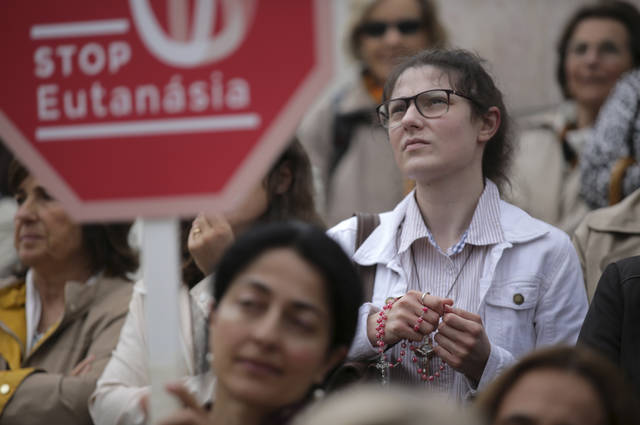LISBON, Portugal — Portuguese lawmakers were holding a landmark debate Tuesday on whether to make Portugal one of only a handful of countries in the world allowing euthanasia and doctor-assisted suicide.
The debate in parliament was scheduled to end in a vote later in the day on four broadly similar bills tabled by left-leaning parties, including the governing Socialist Party.
Euthanasia — when a doctor kills patients at their request — is legal in Belgium, Canada, Colombia, Luxembourg and the Netherlands. In Switzerland, and some U.S. states, assisted suicide — where patients administer the lethal drug themselves, under medical supervision — is permitted.
The outcome of Portugal’s vote was uncertain and likely to be close. The two main parties, the Socialists and the main opposition Social Democratic Party, allowed their lawmakers to vote according to their conscience. The two parties have 175 of the 230 members of the Republican Assembly, Portugal’s parliament.
Even if one of the four bills is approved by a simple majority, it could still be blocked by President Marcelo Rebelo de Sousa. The head of state has no executive powers but can veto legislation. Rebelo de Sousa, reluctant to influence the parliamentary debate, hasn’t said what he would do if the “yes” vote wins.
Euthanasia was forced onto the political agenda by a public petition urging its introduction in 2016.
The deeply divisive issue is the latest point of friction between faith and politics in this predominantly Catholic country. The Portuguese parliament, prodded by a series of left-leaning governments determined to bring about what they called a “modernization” of the country, has in recent times voted to permit abortion on demand and same-sex marriage.
Four political parties — the governing center-left Socialist Party, the radical Left Bloc, the Green Party, and the People, Animals, Nature party — have tabled bills proposing euthanasia and doctor-assisted suicide. Inciting or assisting euthanasia is currently punishable by up to three years in prison.
“The Constitution says life is an inviolable right, but it doesn’t say it is a duty that cannot be relinquished,” said Maria Almeida Santos, a Socialist, during the debate, adding that her party’s euthanasia proposal “asserts the right to a life with dignity.”
Social Democratic lawmaker Rubina Berardo, an opponent of right-to-die legislation, replied, “Does sickness take away the dignity of being human? Even if it is a serious and terminal illness?”
The Socialist bill, which was likely to earn the most support, covers patients who are “in a situation of extreme suffering, with an untreatable injury or a fatal and incurable disease.” Two doctors, at least one of them a specialist in the relevant illness, and a psychiatrist would need to sign off on the request to die. The case would then go to a Verification and Evaluation Committee, which could approve or turn down the procedure.
The process is postponed if it is legally challenged, or if the patient loses consciousness, and doctors can refuse to perform the procedure on moral grounds. Oversight is provided by the General-Inspectorate for Health.
To discourage people from traveling to Portugal to end their life, the bills all stipulate that patients must either be Portuguese citizens or legal residents.
The bills are similar, with slight differences. The Left Bloc, for example, wants euthanasia to go ahead even if the patient is unconscious, as long as the patient previously stipulated in writing that was his or her wish. The People, Animals, Nature party’s bill, meanwhile, says euthanasia can be carried out only within the public health care system, not by private clinics.


